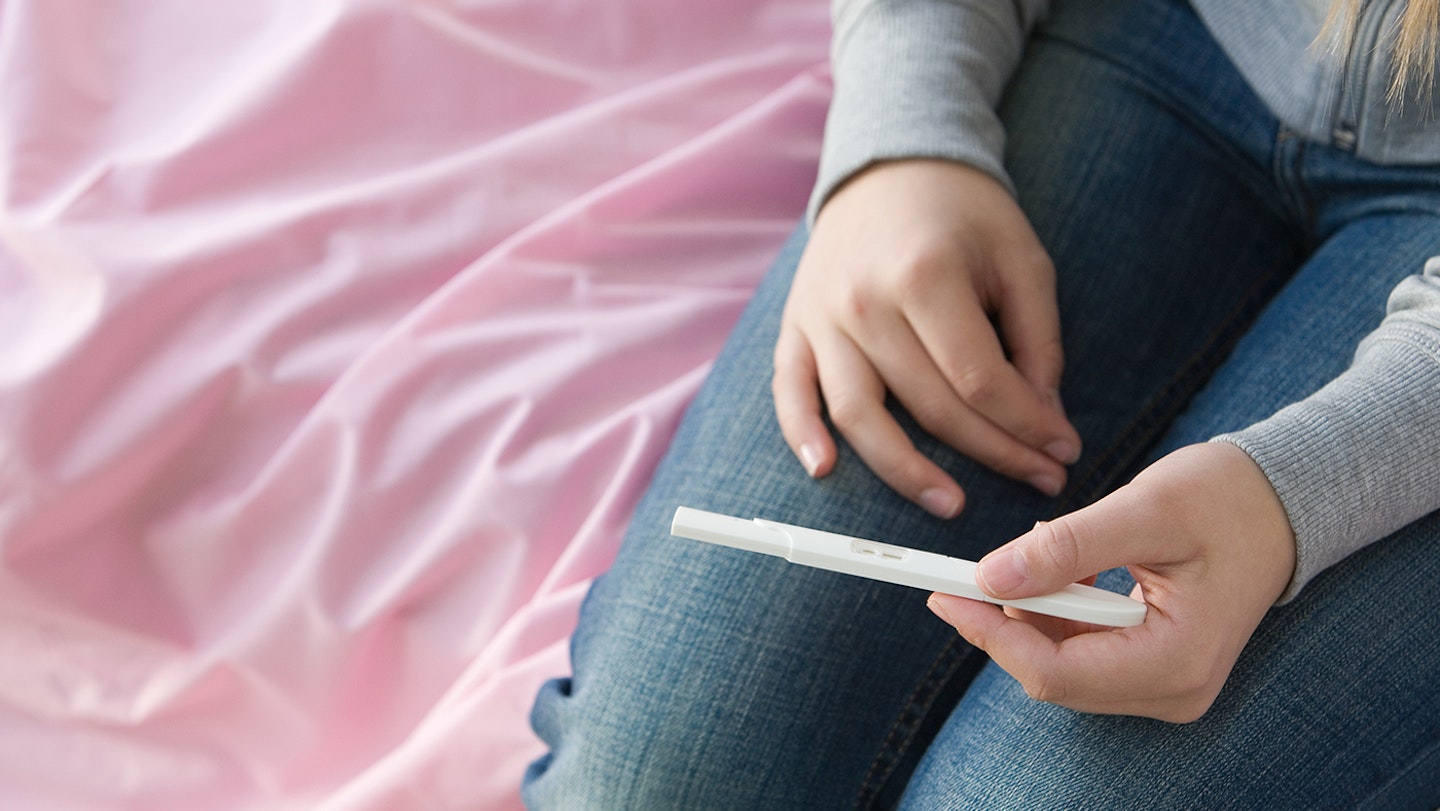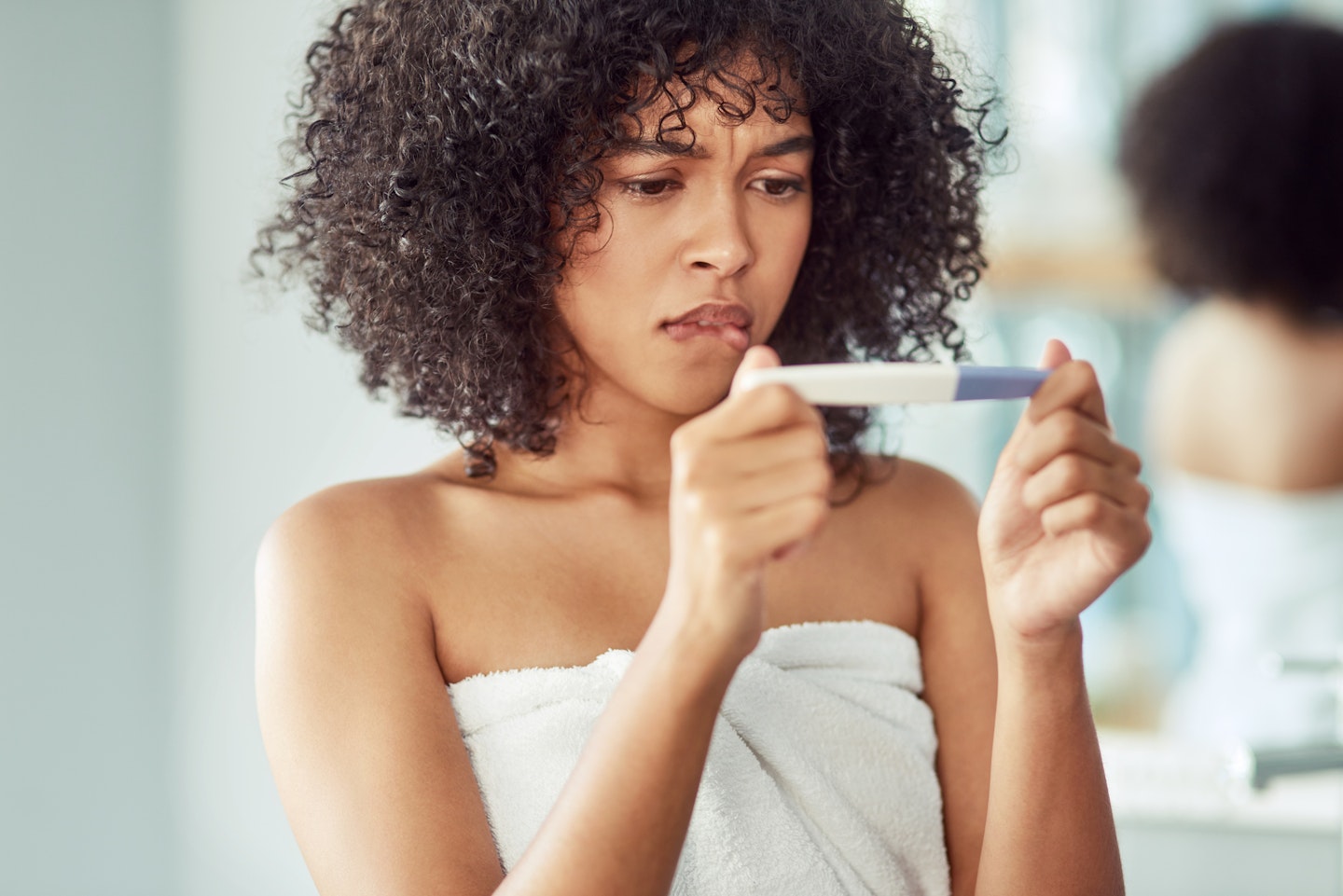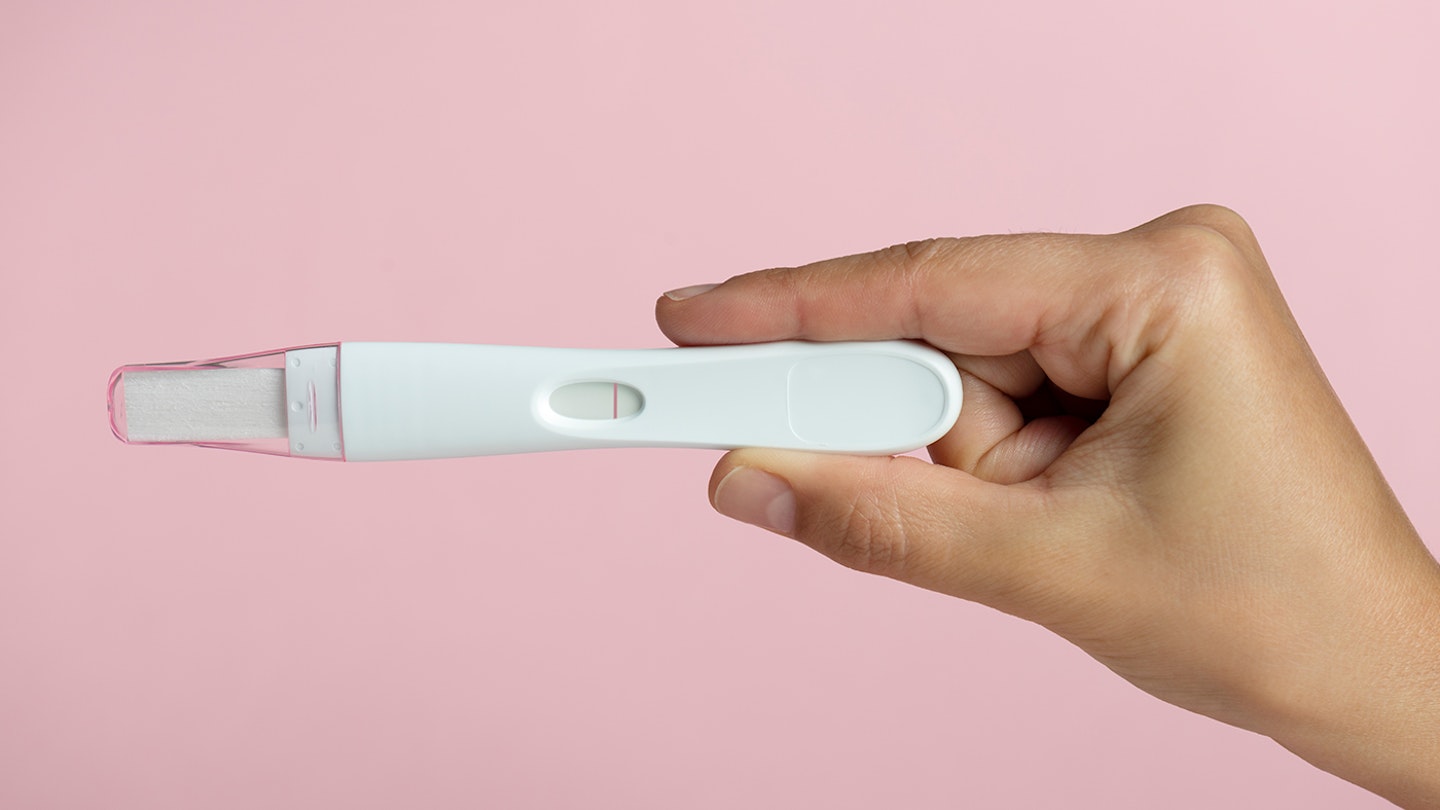
Medically Reviewed by: Dr. Tiffany Pham
It can be incredibly confusing when you experience pregnancy symptoms, but get a negative test result. If this happens, it's known as a false-negative test. While not very common, it does happen and can leave you worried and emotional, wondering why it's happening when you're certain your swollen breasts, strange cravings and late period are telltale signs that you're pregnant.
While we're often led to believe that over-the-counter pregnancy tests are accurate, this isn't actually true. Yes they are quick and easy, but not always reliable.
Lesley Gilchrist, a registered midwife and co-founder of My Expert Midwife explains that a false negative result when you are actually pregnant, can happen for a number of reasons.
"When you're pregnant a hormone called hCG (human chorionic gonadotropin) is produced as the fertilised egg implants and the placenta is formed. This hormone is produced in small amounts on day one but increases rapidly over a short period of time in early pregnancy. The earlier a test is performed the higher the risk of it not detecting the small amounts of hCG, thus producing a false negative result. Likewise, the later a test is performed the higher the chance of getting a more accurate result."
How do pregnancy tests work?
“When you are pregnant, a fertilised egg embeds itself into the lining of the uterus (womb) and your body produces the hCG hormone." Lesley says. The pregnancy test simply looks for the presence of this hormone to produce a result.
“For a urine-based self-test, you simply pee onto the stick provided and follow the instructions for how long to wait and how to read the result. Some tests are so sensitive they can detect the presence of HCG before you have even missed a period. For a blood test, the lab will be looking for the presence and levels of hCG. Blood tests may be recommended for those women who, for health reasons, need to confirm their pregnancy immediately.”
There are a lot of reasons why you might feel pregnant but end up with false negative on a pregnancy test - here are 8 of them.
8 reasons you may get a false negative pregnancy test
You're pregnant but you bought a faulty test
Lesley says you can absolutely be pregnant when testing negative on a pregnancy test, regardless of whether you have used a cheap pregnancy test or a pricier one. "Pregnancy tests are not 100% accurate and a negative result does not confirm that you are not pregnant," she says. "You may also get a false negative result from sticks that are out of date, or from those that have not been stored or used You're pregnant correctly.”
You're pregnant but you're testing too early
If you are tracking your cycles and ovulation, some home pregnancy tests can be used to detect a pregnancy after unprotected sex as early as 7 days before your expected missed period. However, testing early may result in a false negative test. “Some tests are so sensitive they can detect the presence of hCG before you have even missed a period," explains Lesley. "Home pregnancy tests can be carried out from the first day of a missed period or from 21 days after unprotected sex.
“There are some extremely sensitive pregnancy tests available that can be used before you even miss a period. However, it is worth noting that hCG may not be at detectable levels in the very early days of pregnancy, a later test may be more accurate."
If there is a concern for pregnancy, it is always advisable to repeat the test within a week or at the time of the missed period. For those who have irregular periods or don't track their cycles at all, a home pregnancy test can be done approximately 14-21 days after having unprotected sex. As always, repeat testing a week later if you need to verify prior test results or if the period is missed.
You're pregnant but your hormone levels are too low

If you've noticed that your period is late but your pregnancy test is still showing a negative result, you may be fa bit puzzled about the whole thing. "It could be that the level of hCG, that unique pregnancy hormone, is too low to be detected when you do the test," explains Lesley. “hCG in urine is often more concentrated in early morning samples during those early days. However, as the hormone increases rapidly, the longer it has been since a missed period the easier the hormone will be detected at any time of day by the test.”
You're pregnant but you misused the test
While pregnancy tests are relatively straightforward to use nowadays, it's understandable that things can still go wrong or you perhaps skip over certain instructions. Weeing on the wrong part of the testing strip or not leaving the test for long enough can also affect the results of the test.
You're pregnant but you're overhydrated
If you're someone who is well-hydrated and makes sure to drink plenty (yes, we see your Stanley Quencher cup), this could be affecting your pregnancy test results. “Overhydration may dilute your urine so much that HCG levels become undetectable, hence the advice in early days of testing to use an early morning sample when urine tends to be naturally more concentrated," says Lesley. This isn't a sign to cut back on water, just don't drink too much the night before or the morning of your test.
You're pregnant but you're miscalculating your cycle
For a pregnancy test to be as accurate as possible, you need to take it at the right time. Generally this is after the first day of a missed period but if your cycle is irregular, or you don't track it closely, you might not know when this exactly is. If this is the case it can mean that you're testing at a time when the hCG is too low to be detected in the urine. This can result in a false negative test when pregnant.
You're pregnant but have a medical condition
Many medical conditions including thyroid problems or Polycystic Ovarian Syndrome (PCOS) can cause irregular or missed periods, potentially leading to a false-negative pregnancy test. In these scenarios, you should contact your GP who will be able to run blood tests to confirm if you are or aren't pregnant.
You're pregnant with twins
While it's extremely rare, being pregnant with twins can cause a false negative pregnancy test. As we've explained above, pregnancy tests work by detecting raised levels of Human Chorionic Gonadotropin (hCG) in your urine. If you're expecting twins, those levels will be even higher than normal, and while you'd expect this to be easily picked up on a test, the opposite actually happens. Extremely high levels of hCG can confuse even the best pregnancy tests, and return a negative result, known as the 'hook effect'. So while it's rare, it is possible to have a false negative pregnancy test if you're pregnant with twins. If you've been trying to conceive and have pregnancy symptoms but a negative test, it's worth making an appointment with your GP.

What to do if you think you are pregnant but the pregnancy test is negative
If you're convinced you're pregnant but have a negative test, it's worth waiting a week and taking a second test. However, if the later tests still come back negative but you still haven't had a period, Lesley suggests that you should consider talking to your doctor. “Consider seeking medical advice if you miss more than one period and still test negative, as you are unlikely to be pregnant and may need investigations. It might be a good idea to look at your lifestyle and make positive changes to reduce stress, improve nutrition and your general wellbeing.”
Coping with the emotions of trying to conceive
Trying to conceive can be a rollercoaster of emotions. It's important to support your mental health when trying for a baby as it can be a drawn out process, particularly if you're undergoing fertility treatment. If you need it, ask for help. There are so many organisations out there who can help you navigate the high and lows of trying to get pregnant and pregnancy itself.
About the expert
Lesley Gilchrist, BSc (Hons) Midwifery Studies, MSc Clinical Research Methods, is the CEO and founder of 'My Expert Midwife' and has been a midwife since 2003, working in some of the largest teaching hospitals in Europe. Through this time, Lesley has gained invaluable experience and insight into maternity care, labour and birth.
Dr Tiffany Pham is a board-certified obstetrician and gynaecologist and medical advisor for Flo Health, based in Houston, Texas. Pham is passionate about helping women get access to necessary health services and medically-accurate health information and better understand their bodies.
Adejumoke Ilori is a Commercial Content Writer for Mother&Baby. She is a mum to a little girl and has worked for various digital platform. She has produced content that empowers women from all walks of life by sharing real life stories based on relationships, loving yourself and motherhood.
